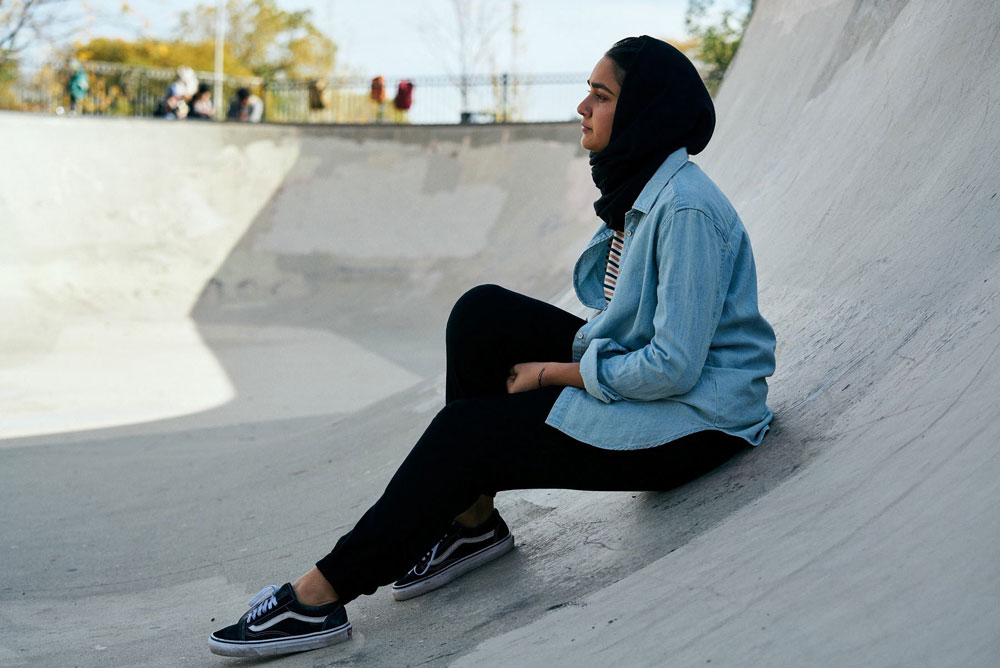At a certain point in “Hala,” Eram (Purbi Joshi) decides to tell her daughter (Geraldine Viswanathan) after whom Minhal Baig’s film is named, about how she came to marry her father, an arrangement made by their parents in Pakistan, hoping to quell her increasing sense of disillusionment about her future. Under the circumstances, Eram isn’t about to insist that having no choice in who she married is a romantic one, but rather that it enabled her and Hala’s father Zahid (Azad Khan) to leave Karachi “to America to change our lives.”
“But did you?” Hala asks back, not exactly enchanted with the answer. With the way Baig and cinematographer Carolina Costa compose shots in “Hala,” you’d think the land of the free is full of walls that the teenager finds herself running up against, even only a few months away from graduating high school and heading to college. Yet refreshingly Baig largely steers away from making a film about the usual rites of passage to overcome or even the cultural alienation that Hala might feel in being the only one in class with a hijab in favor of a fascinating consideration of power as Hala comes to discover things about her parents’ marriage she didn’t know before, shifting her admiration from one to another, and finds herself at 18, feeling powerless but in actuality having more influence at times than she knows what to do with.
From the start of Baig’s strong second feature, Hala is partial to Zahid, helping him with crossword puzzles at the breakfast table and speaking English with him while her mother can only speak Urdu, though no matter what the language, they share no rapport. In charge of keeping the household running and her daughter on track while Zahid works at a high-end law firm, Eram is responsible for laying down the law, insisting on morning prayers and buying baggy clothing for her daughter to eliminate temptation with boys. Zahid is seemingly more permissive, allowing Hala to skateboard and suggests relax her rules every now and then, though when it comes to boys, he and Eram are on the same page, intending to find a good partner for Hala the way their parents did for them.
It seems destined that Hala to become interested in an Anglo classmate (Jack Kilmer) before this can happen, but the relationship exposes the hypocrisy of her parents’ plans in a different way than you’d think and what initially appears as paternal concern on Zahid’s part is increasingly portrayed as arrogance emerging from his male privilege, encouraging his daughter towards professional achievement she could never dream of in Pakistan, but deciding who she’ll spend her life with, holding this control over her like a capricious god. Both in Baig’s nuanced writing and Viswanathan’s delicate, affecting turn, it’s clear she’s impressionable and far from a finished product and as she internalizes how she’s been made to feel by her parents, Hala is defiant on one level, but provocatively begins to incorporate their behavior into hers during this formative moment, potentially extending a legacy of unfortunate cultural attitudes either in rebellion or emulation, even if she’s able to escape her present predicament.
The film is tremendously moving in depicting how Hala comes to see her mother in a new light, seeing Eram’s strength for the first time as well as realizing her own when she starts to recognize the dynamics that made her parents’ marriage work begin to fray and how their roles in the “good cop, bad cop” facade her parents put up for her upbringing weren’t necessarily ones they chose. However, Baig is after something even more complicated than ending “Hala” with a mere lesson learned and, with bold but unassuming choices throughout, crafts a portrait of a young woman that’s as intriguing to think about where her life with lead as the part of it you’ve been privy to. It’s an exquisite, well-crafted drama and like Hala, you’ll be eager to see where Baig goes next.
“Hala” will screen at Sundance on January 28th at 5:30 pm at the Marc Theatre, January 31st at 12:15 pm at the Eccles Theatre and February 1st at 11:45 pm at the Prospector Square Theatre in Park City.




